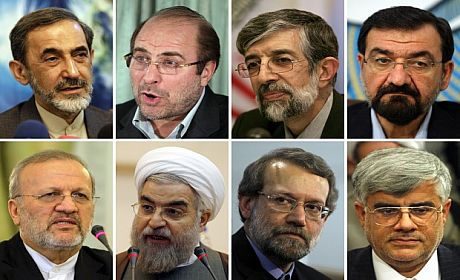Iran’s Next President and the Nuclear Dossier

In less than two months, the presidential election will be held in Iran. Perhaps the first question that any candidate is faced with is about his solution for the present problems of the country, especially problems in foreign policy.
First we must look at the present trend in the country and see if this trend is going to be continued or changed? Has the principalist government acted successfully during the past eight years in the area of foreign policy? In my opinion, a general assessment of the diplomacy of the principalists shows that no high grade can be given to them. On the contrary, I believe that their general strategy in foreign policy, more than being in the national interests of the country, has been in line with their propagandistic slogans and approaches, the results of which dealt serious blows to our national interests.
Iran’s foreign policy during the governments of Mr. Hashemi and Mr. Khatami was defined as a policy of détente. This means that these governments attempted to manage their relations with countries and powers which had historical and institutionalized hostility towards the Islamic Republic of Iran so that they would not confront Iran. These powers are the EU countries including France, Germany, Italy, Belgium, and Austria, and Asian countries like Japan, India, etc.
But unfortunately the principalists, since 2005 when they came to power, have had an aggressive diplomacy in their foreign policy which has pushed the mentioned countries to stand alongside the US. In these last days of the government, we see that even countries like Brazil and Argentina, which to some extent had cooperated with Iran during the last few years, are now standing beside to the US.
It seems that among the Islamic Republic of Iran’s foreign policy issues, the nuclear issue is more important. Any presidential candidate must explain his approach with regard to this issue.
Iran’s nuclear crisis began during the reformist government. Since the beginning of the 2000s, when the MKO published documents with regard to Iran’s nuclear program and Iran’s dossier was formed in the IAEA, this dossier has been discussed in the international community and the reformist and the principalist governments of Iran have taken different approaches in this regard.
The policy of the reformists, even though it was not tumultuous, was a policy which could bring the least damage to Iran’s national interests. The result of such a policy was that neither was Iran’s dossier referred to the UN Security Council by the IAEA Board of Governors, nor were the sanctions imposed against the Islamic Republic of Iran as heavy and expanded as they are now. Besides, the nuclear activities were advancing even though at a slower rate.
But the principalists and their government, led by Mr. Ahmadinejad who came to power in 2005, did not pursue such a policy and proudly stated that they would advance the nuclear program at full speed, saying that the western countries, the US, Europe, the Security Council, Israel, … could not do anything to prevent this trend.
Therefore, anyone who intends to run the country knows that the sanctions have greatly impacted Iran’s situation in the international scene and its economy and such a situation cannot continue and solutions must be found to remove the sanctions. Now the question that is proposed is why have the western countries imposed sanctions against Iran? Has Europe’s hostility led to the imposing of sanctions against Iran’s oil or Iranian banks? Have these sanctions been the result of certain policies of Iran? Can these policies be changed or are they the fixed and unchangeable principles of our country?
Perhaps these days the question that must be asked is to what extent should Iran’s nuclear program continue and under what conditions can it change its path? This means that the elites of the country must discuss this matter and decide on how high a cost Iran should pay for its nuclear program? Is the heavy cost that we are paying for the nuclear program justified by its benefits? What I mean by the costs are those which are directly related to this program and the heavier costs that are indirectly affecting Iran’s national economy. As an Iranian, I believe that the time has come for us to review our policies with regard to the nuclear program.
Based on the fatwa issued by the Supreme Leader, production of nuclear weapons is forbidden, thus we do not intend to build an atomic bomb and our goal behind the uranium enrichment program is to produce fuel for the nuclear reactors; whether it is the Bushehr power plant or the other plants which are to be built during the next few years. The question is that if the cost of producing this fuel inside the country is ten times more than its international price in the world markets, is providing this fuel with a high cost a wise policy?
Like all countries of the world, the election is the scene of discussing the important issues of the country and the issue of foreign policy, particularly the nuclear program, is one of the most important issues which should be discussed among the elites of the society so that the best approach could be chosen by the next government.

